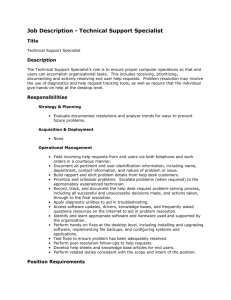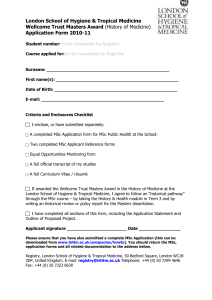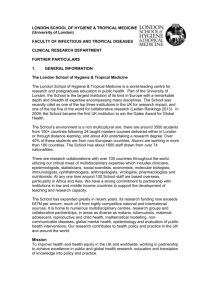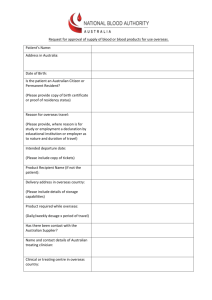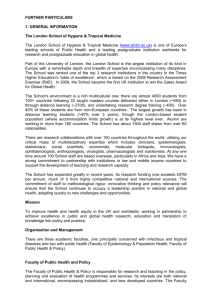Review of exceptional funding for institutions London School of
advertisement
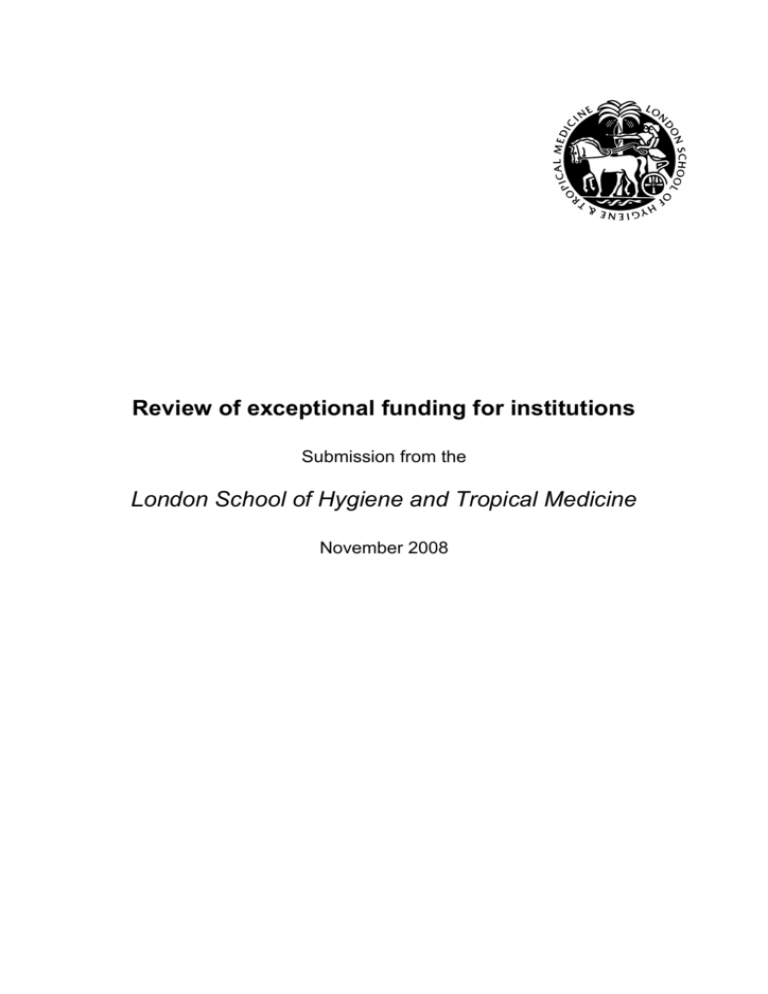
Review of exceptional funding for institutions Submission from the London School of Hygiene and Tropical Medicine November 2008 London School of Hygiene and Tropical Medicine The School The London School of Hygiene and Tropical Medicine is one of the world’s largest research and training centres for public health and tropical medicine. It has the largest postgraduate student population of any UK clinical higher education institution, and its 511 academic staff provide world leading expertise from basic laboratory sciences such as molecular biology, through genomic, drug and vaccine research, to clinical medicine, epidemiology, statistics, demography, nutrition, economics and health policy. This critical mass and multidisciplinary strength are unique in Europe and make the School comparable with the other two world leading centres in its field: the Harvard School of Public Health and the Johns Hopkins Bloomberg School of Public Health in the USA. The School has a proven track record of innovative work to ensure that research and teaching in laboratory, clinical and public health areas benefit individual patients and communities within the UK and around the world. The quality and relevance of its work are demonstrated by its impact on policy and practice at national and international level. It has close links with UK Government departments and other agencies, and works with staff in more than 40 UK universities. Its international collaborations include field programmes and active research partnerships in over 100 countries, and 80 members of School staff are based in 22 overseas locations in Africa, South Asia, South America, and Russia. Many of its alumni go on to hold senior positions in health ministries, universities, hospitals and public health organisations both in the UK and around the world. The School is one of the most research intensive HE institutions in the UK, and in 2007-08 attracted over £43 million of external funding for research grants and contracts; equivalent to 60% of its total income. This research strength – combined with extensive UK and international collaborations - underpins the School’s teaching, and attracts approximately 3,500 Masters and research students from the UK and 122 countries around the world. The School currently offers 18 MSc courses in London, attracting 600 Home and overseas students, with 2,500 students on a further 4 MSc courses offered through distance learning. Over 350 students are registered for research degrees. The School has grown significantly over recent years: its annual income has increased from £41m in 2000-01 to £78.9m in 2007-08. Much of this growth has been driven by its success in attracting research funding. But the School’s distance learning programmes – launched in 1998 - have also been highly successful, with the result that the School’s student population has grown by 125% over this same period. Overall HEFCE funding accounts for just under 19% of the School’s income, which is a smaller proportion than many much larger, multi-faculty universities.1 Its recurrent grant for 2008-09 will be £14.5m, of which £10.7m (74%) is QR and £3.8m (26%) is funding for teaching. The targeted allocation of exceptional funding accounts for £728K (20%) of this teaching grant. Additional public value The School’s multidisciplinary strength and international perspective underpin its teaching. All of the School’s academic staff teach, ensuring that taught courses reflect its world-leading research. While HEFCE funding makes up a relatively low proportion of its income, exceptional funding is essential to maintaining the range and quality of this teaching. Any cut in funding would lead to a reduction in specialist training and continuing development for health professionals in the UK, and for those working for NGOs, government agencies and other overseas bodies. The School does not hypothecate exceptional funding to support specific teaching activities or particular aspects of its provision, and could not do so given the level of integration between its teaching, research and other activities. While teaching is a central part of the School’s mission, we would also argue strongly that any assessment of the additional public value that the School provides in return for its HEFCE block grant must also take account of its wider contribution to UK Government priorities and to the UK higher education sector. Any reduction in funding will therefore not only affect the School’s teaching, but its 1 London School of Hygiene and Tropical Medicine ability – and that of the HE sector - to respond to the major policy challenges identified, for example, in the Government’s White Paper on innovation, DFID’s key research strategy for international development, and the Department of Health’s new global health strategy developed following a review of the UK’s contribution to health in developing countries led by Lord Crisp.2 Contribution to public health in the UK and Europe Details of the School’s MSc programmes are given below. But the School’s breadth of expertise also provides additional public value for the UK through its collaborations with the Department of Health (DH), DFID, DEFRA and other Government departments. Staff also have strong links with national agencies including the Health Protection Agency, Food Standards Agency, Office for National Statistics, the Health and Safety Executive and the National Institute for Health and Clinical Excellence (NICE). At a regional level, the School works with the Greater London Authority, several local London Boroughs and hosts the London Teaching Public Health Network. Most of the School’s senior medical staff hold honorary contracts through which they contribute to the NHS, generally at national and strategic health authority levels. This close involvement with clinical practitioners and policy makers is vital to support its teaching. Specialist registrars in public health and surgery are seconded to the School as part of their training programmes, and honorary appointments to the School cement relationships with practitioners employed elsewhere, including the Royal College of Surgeons, the Intensive Care National Audit and Research Centre and BMJ. Staff also play an important national role in clinical tropical medicine through their work at the Hospital for Tropical Diseases. At European level, the School has worked with DFID, UNICEF, the European Commission and the World Bank in areas including: cancer prevention and treatment in Europe; the impact of alcohol on mortality in Russia; tobacco control policy in various countries and preparedness for pandemic flu. The School’s contribution to global health The School’s work also forms an important part in the UK’s contribution to improving global health; from basic laboratory science through to health policy and delivery. This was recognised by Lord Crisp’s review which described the School as “a leading school of international public health…a model for others elsewhere and still a very influential body globally”. Through its teaching and research, the School has made a significant contribution to public health problems of global importance including malaria, HIV/AIDS, tuberculosis, cardiovascular diseases, mental health, injuries, nutrition, and maternal and child health. New diseases are also emerging at an unprecedented rate, mainly owing to increasing opportunities for pathogens to spread rapidly and in an unrestricted way. The School’s multidisciplinary approach and international network of experts means that it is ideally positioned to contribute effectively to predicting, averting and combating emerging infectious diseases and zoonoses, and to training health professionals and policy makers to deal with these threats. The School’s alumni work in more than 160 countries and external evaluations have shown that many report the School has had a major impact on their working lives. As noted earlier, many move on to leading positions in health ministries, universities, major hospitals and public health organisations around the world. The School’s alumni include, for example: Professor Gilbert Balibaseka Bukenya – Vice-President of Uganda; Dr Manuel Dayrit - Director, Human Resources for Health at WHO; Dr Tedros Adhanom Ghebreyesus - Minister for Health in the Federal Democratic Republic of Ethiopia; Dr Julian Lob-Levyt Executive Secretary of the Global Alliance for Vaccines and Immunization; and Dr Le Vu Anh – Dean of the Hanoi School of Public Health in Vietnam. In short, the School is a national and international resource. Maintaining its specialist teaching and the range and depth of expertise which HEFCE funding underpins will be even more critical to meet future 2 London School of Hygiene and Tropical Medicine challenges, and to maintain the HE sector’s contribution to UK Government priorities; not only within DIUS, but also the DH, DFID and the Commission for Africa. Additional Costs As noted earlier, the School does not allocate exceptional funding separately. It is therefore not possible to identify specific costs which are met from the targeted allocation rather than other elements of the block grant. However, the additional public value outlined above is dependent on continued investment in each of the areas outlined below. Teaching The School is a leading centre for postgraduate teaching in public health and tropical medicine. Its student population is diverse, and in 2007-08 students on London-based programmes came from 102 countries. On arrival at the School many of the students are already experienced professionals, and this – combined with their cultural and national diversity – makes a significant contribution to the learning of their fellow students. Currently, the School is the only UK institution to offer MScs in all of the following areas: Biology and Control of Disease Vectors Community Eye Health Control of Infectious Diseases Demography & Health Epidemiology Health Policy, Planning and Financing Immunology of Infectious Diseases Medical Microbiology Medical Parasitology Medical Statistics Molecular Biology of Infectious Diseases Public Health Includes streams in Environment and Health, Health Economics, Health Promotion, Health Services Management, Health Services Research and Public Health Public Health in Developing Countries Public Health Nutrition Reproductive and Sexual Health Research Sexually Transmitted Infections and HIV Tropical Medicine and International Health Veterinary Epidemiology. While comparable courses can be found in some other UK HEIs, none offers the full range nor the unique international perspective available at the School. The modular structure of the School’s MSc programme – offering a total of 130 modules - also provides students much greater flexibility to tailor their studies to meet their own needs and interests, and to provide the high level skills required by employers in specialist fields. By bringing together students from different specialist courses, this modular structure enriches their learning. But it also ensures that teaching groups are as cost effective as possible. The School does not run courses for which there is not an identified need, either from students or prospective employers. However there are some courses which attract low numbers but which provide training in highly specialised areas that would not be provided elsewhere. These include, for example, the MScs in Biology and Control of Disease Vectors (which has 5 registered students in 2008-09) and Medical Parasitology (which has 6). These courses and the supporting modules could not be maintained without exceptional funding. The School’s other MSc courses attract higher numbers, with the largest (in Public Health) having 150 registrations this year. But in many areas the nature of the courses and the need for specialist laboratory space imposes limits on recruitment. In particular this affects the courses in Community Eye Health, Immunology of Infectious Diseases, Molecular Biology, Microbiology and Tropical Medicine and International Health. The School therefore cannot achieve the economies of scale that might be possible in less specialised areas. Nor can it cross-subsidise specialist teaching from large undergraduate programmes, as might be possible in larger institutions. 3 London School of Hygiene and Tropical Medicine There are also distinctive features of the School’s teaching which impose additional costs. For example, all of its MSc courses include opportunities to undertake projects, and in 2007-08 over 100 MSc students undertook projects overseas as part of their degree. These overseas projects are an integral part in particular of the courses in Control of Infectious Diseases and in Tropical Medicine and International Health, although Home students from other courses also spend periods overseas where required by the focus of their work. A substantial proportion of research degree students also undertake fieldwork outside the UK. This inevitably imposes additional costs, both in academic staff time and in administration (including, for example, risk assessment, insurance arrangements, and ensuring that appropriate support is available to students on the ground). The School also incurs additional teaching costs due to the level of clinical input to its courses. Twentyseven of the School’s professors are clinicians, and it employs a further 66 clinical academic staff. All of these staff teach; six MSc courses are also led by members of clinical staff, and clinicians lead 26 course modules. Many other courses and modules are dependent on teaching by clinical staff. To some extent, these additional costs are recognised through HEFCE’s price groups and, as noted earlier, most of the School’s senior medical staff hold honorary NHS contracts. But unlike other clinical medical schools it does not receive NHS funds to support consultant clinical academic posts. This is because it is not involved in teaching undergraduate medical students and because clinical staff do not have contracts with a single NHS trust. It also has many fewer NHS-funded clinical academic training posts than undergraduate medical schools, despite its role in training specialist registrars for the NHS. Given the scale of its research, the School is able to re-charge approximately 65% of its clinical staff costs to external funders for their work on research projects. But this clearly cannot fund the essential contribution that clinical staff make to teaching and the School’s other work. In 2007-08 £2.6 million of clinical salary costs were therefore met from general funds. Again, this would not be sustainable if HEFCE funding were to be reduced, and the contribution of clinical staff to teaching could not be maintained. Academic Staff A number of UK institutions have considerable expertise in public health, and work in similar fields to the School. But it is the School’s concentration of expertise in a single institution which delivers additional public value; both in teaching and by providing the capacity to respond to UK Government priorities and the developing needs of other stakeholders within the UK and internationally. In addition to the costs of core-funded clinical staff, the School maintains posts in a number of disciplines which are essential to its work but for which there is limited direct external funding. These include, for example, senior posts in parasitology and vector control: these staff are essential to maintaining MSc courses in these areas, and to the School’s other work on insect-borne and water-borne diseases and those associated with poverty. It is also unique in maintaining posts in specialist areas including health policy issues such as tobacco control, global trade and health and the global governance of health, in community eye health, and in conflict and health. These posts are essential to the MSc in Public Health, and make important contributions to a range of other courses. In the field of conflict and health, for example, the School has made an important contribution to training UK and EU students for work with government bodies and NGOs, and is currently working to develop the Afghan government’s capacity in public health. The School’s position as a specialist, world leading institution is also reflected more generally in its staffing profile. Seventy-one of its academic staff (14%) are professors, compared to 9% of staff at professorial level across the sector as a whole.3 The School is also unusual in the international profile of its staff, which reflects both specialist areas of expertise and the need for staff – particularly those involved in teaching - to have recent field experience in low and middle-income countries. This imposes additional recruitment and salary costs and means that the School has to compete internationally to ensure that it attracts and retains the highest quality staff. 4 London School of Hygiene and Tropical Medicine As with its clinical staff, the School seeks to recover these additional costs from its research funders wherever possible. But all of these specialist staff also teach on MSc programmes, and exceptional funding therefore makes an important contribution to meeting this proportion of their costs. Facilities The School’s laboratory and clinical work is necessarily high cost, and this is again reflected by HEFCE’s price groups. But the nature of the School’s work requires some very high specification facilities, including a 600m2 category 3 biohazard containment laboratory, category 3 insectaries and a category 3 animal facility (currently being refurbished and due for completion later in 2008). This ratio of very high cost facilities to standard laboratories is significantly higher than in most other HE institutions, but is essential to its work and to underpin the additional public value which it delivers in return for its HEFCE funding. Beyond their direct operating and maintenance costs (which can to some extent be passed on to research funders), these facilities also impose additional costs which have to be met as a general overhead on the institution (including energy and security). These are significant given the size of the School. The School’s Library similarly reflects its specialist mission and has one of the most extensive collections in the world of books and journals in the fields of international public health and tropical medicine. The Library also holds archives dating from the mid-nineteenth century, including correspondence and personal papers of scientific, medical and public health professionals involved in the search for preventative measures and cures to diseases including malaria, filariasis, cholera and leprosy. The Library provides services not only for staff and students but for 2,000 external visitors annually. School’s contribution to UK and international agencies While exceptional funding is allocated through the HEFCE teaching grant, the additional public value provided by the School – like the other specialist institutions covered by the current review - extends significantly beyond teaching. It is the overall level of the HEFCE block grant that enables these institutions to carry out valuable work with their key stakeholders - whether this is employers, national bodies or local communities - and to contribute to policy. For the School, UK Government bodies and international agencies are some of its most important stakeholders. Staff from many HE institutions provide advice for such bodies, but relative to its size this represents a significant overhead for the School and is in addition to the work which staff undertake on research projects which they fund. Since 2001, School staff have served on more than 150 national and international committees, advisory boards and review groups. To give just a few examples, these have included: Chairs of the DH/Chief Medical Officer’s Committee on New and Emerging Infections, the Commissioning Group for the DH Health Reform Evaluation Programme and the MRC’s Global Health Strategy Group; Chairs of 10 WHO boards and committees including expert groups on Globalization, Trade and Health, and the Prevention of Cardiovascular Disease in Developing Countries; and members of a further 25 WHO committees and advisory groups including its Advisory Committee on Health Research, and its Special Programme for Research and Training in Tropical Diseases (TDR, which is cosponsored by the World Bank, UNICEF and the UN Development Programme). The School also receives regular requests for ad hoc advice on specific issues. This level of input could not be maintained if HEFCE funding were to be reduced. Alternative ways to secure public value As noted earlier, the School has been highly successful at attracting funding from non-HEFCE sources. But much of this income is non-discretionary, and is awarded to undertake specific pieces of research or other work. The current level of HEFCE funding is essential to maintain capacity in specialist areas to respond to emerging threats to public health through teaching and policy advice. Given the nature of its 5 London School of Hygiene and Tropical Medicine work, there is no single alternative source of income which could compensate should exceptional funding be withdrawn. Government Funding for public health is diverse, and while individual agencies or Government departments might be willing to support work in particular areas, none would fund the full range of work undertaken by the School. It could be argued that the DH should provide additional funds to support the School’s contribution to the NHS, for example. But as noted previously it has many fewer NHS-funded clinical academic posts than other medical schools and as an entirely postgraduate institution cannot access NHS funding that is geared for undergraduate training. Similarly an argument could be made for DFID supporting the School’s contribution to international agencies, which is not recognised through other funding streams. But other areas of its work would not fall within DFID’s remit. While the School maintains very productive relationships, it is not the policy of either Department to provide long-term funding for posts or to maintain facilities within HE. Given current pressures on public expenditure, the reality is also that neither Department nor other agencies have additional funds available. In some larger institutions it may be possible to cross-subsidise such work of public value from commercially funded activities. The School has longstanding relationships with industry, including GlaxoSmithKline for example. But given the fields in which it works, there are limited opportunities for the School to offer commercially-priced consultancy or professional development programmes, and industry funding accounts for a relatively small part of its research income.4 Tuition fees As an entirely postgraduate institution, the School has the freedom to determine its own tuition fees and has undertaken periodic reviews to ensure that these are set at an appropriate level. The findings of the most recent review - covering 150 courses across 40 UK and overseas institutions - were considered by its Planning and Finance Committee in July 2008. This review showed that some institutions were charging higher fees, particularly for Masters courses in health management. Imperial College, for example, charges £17,900 to UK and EU students for its MSc in International Health Management compared to the School’s current Home fee of £4,640. But management courses with significantly higher fees tend to be offered through institutions’ business schools and are therefore set in relation to MBA programmes. This is the case at Imperial, where the course is run by the College’s business school and is aimed at preparing graduates for management careers in organisations including pharmaceutical and health technology companies, consulting firms, healthcare provider organisations and insurance agencies. The focus of its teaching reflects this target audience. While the course shares some common elements with School MSc courses – such as health economics and health systems – its core modules also have a strong emphasis on areas such as accounting, entrepreneurship and marketing. It is therefore quite different from the teaching in health services management provided by the School, which is primarily designed to equip students with skills for a range of management positions in the NHS, overseas health ministries and NGOs. The salaries for such posts are significantly lower than those available in industry, and employers are unable to offer the same level of sponsorship that would be available within multinational companies. The market would therefore not bear the level of fees charged by Imperial or others offering more business-focussed courses. The survey also revealed some significant differences in Overseas fees, particularly for laboratory-based courses: the Overseas fee for Imperial’s MSc Immunology is £23,750 and £23,475 for Oxford’s MSc in Integrated Immunology, compared to the School fee of £16,440 for its MSc Immunology of Infectious Diseases.5 But a number of UK and European institutions are charging fees which are comparable to – and in some cases lower than - the School: the Overseas fees for King’s MSc Immunology, for example, is £16,100. The School therefore considers that a significant increase in Overseas fees would have a detrimental impact on recruitment. 6 London School of Hygiene and Tropical Medicine This is a particular concern given the profile of the School’s international students. More than 60% of its Overseas MSc students in 2007-08 were from low and middle income countries, as were a similar proportion of research degree students. Thirty-six percent of its Overseas students were from Africa, and a further 20% from low and middle income countries in Asia. This is very different from the student profile of other institutions offering apparently similar courses, and reflects the particularly relevance of its specialist teaching to students from low income countries. The School also has fewer scholarships available to support such students than larger institutions, although it has begun to address this through the launch of a fundraising campaign. Given its student profile, the School could not simply compensate for the loss of HEFCE exceptional funding by increasing Overseas fees. Significant increases in Overseas fee income could only be achieved by re-orientating courses to attract additional students from high income countries, or those from other sectors. This would take time to achieve, but would also undermine the fundamental mission of the School. It would also run counter to the Government’s commitment to expand the UK’s training programme for overseas medical staff.6 The School has achieved significant additional income from its Distance learning (DL) programme: 2,500 students are now studying for one of four MScs in Clinical Trials, Epidemiology, Infectious Diseases and Public Health, which generated fee income of £2.9 million in 2007-08. The DL programme has also significantly extended the audience for its teaching programmes, offering students the flexibility to benefit from rigorous, research-based teaching whilst continuing to work (although there is an increasing trend for mixed-mode study). The School regards the growth of DL as a significant part of building capacity in developing countries, and has agreed to licence its teaching materials to a number of its partner institutions without charge to support the development of their staff. This approach is very much in line with the commitment in the Government’s global health strategy to increase access to distance learning for professionals in low and middle income countries, and gives the School the potential to play a significant part in the HE sector’s contribution to meeting this goal. Approximately 40% of DL students are from the UK or other EC countries, although the School does not currently receive HEFCE funding for these students. Again, fees for the DL courses are kept under review, but in an increasingly competitive global market it would not be feasible to make significant increases without affecting demand. Following the review earlier this year, the School will nevertheless be increasing Home and Overseas tuition fees for all Londonbased and DL programmes by 7% from 2009-10. These increases were necessary to off-set the loss in income from the withdrawal of ELQ funding. The School does not consider further fee increases beyond this 7% would be realistic or achievable. Cost savings Alongside the increases that the School has achieved in its non-HEFCE income, it has also worked to restrict costs. As a proportion of total expenditure its spending on administration and central services is approximately half the figure for English HEIs as a whole, and is comparable with very large institutions such as Imperial and UCL which benefit from significant economies of scale.7 To some extent this reflects its devolved management structure and the proportion of administration costs re-charged to research sponsors. But it nevertheless indicates that the School is operating effectively and that administrative collaboration with a larger institution would not generate significant cost savings. Given its size the School – like other specialist institutions – does face some challenges in providing staff and students with the same range and quality of support services that might be offered at a larger university. This has been one of the drivers for its work with neighbouring colleges in exploring the development of shared services. 7 London School of Hygiene and Tropical Medicine Collaboration The Bloomsbury Colleges also collaborate academically, including through the London International Development Centre which received start-up funding from HEFCE’s Strategic Development Fund.8 This will bring the School’s expertise together with disciplines in the other colleges including development economics, health education and agricultural economics, and these links form part of a much broader range of collaborations with UK institutions. The School regards these as important to delivering additional public value, and we have identified some areas where closer collaboration could be mutually beneficial. The most obvious example is the potential for sharing high cost equipment for certain types of laboratory research, and we are in discussions with the MRC and other partners regarding the UK Centre for Medical Research and Innovation. While the School has research links with many UK HEIs, in the past year it has been approached by two large, multi-faculty institutions in London which have been keen to develop more formal collaboration agreements. The School has been happy to explore the potential for further collaboration with both institutions, and has identified some specific areas where this could be productive and build on the many mutually beneficial links already in place between us. But our assessment is that any overarching collaboration arrangement is likely to have significantly greater advantages for the larger institutions, and that their approaches have been driven primarily by their desire to access the School’s expertise in specific areas which they could not provide in-house. A number of these areas – such as Health Services Research – relate directly to Government priorities. The other HEIs have been less interested in other specialist, high-cost fields where there is limited scope for increasing research income or student recruitment. We believe that closer links could undermine the School’s ability to maintain its current breadth of expertise and therefore provide the multidisciplinary approaches that underpin its contribution to public health in the UK and overseas. We also believe that closer links with a single larger institution would damage our international profile and inhibit both student recruitment and other partnerships. The fact that these much larger institutions do not have the School’s range of expertise – nor its national and international networks - demonstrates the additional value that it provides as a specialist institution, and also the importance of maintaining its independence. It is this independence that has enabled the School to invest in areas which may be lost in larger institutions, and also provides the flexibility to respond more quickly to emerging issues in public health and stakeholders’ developing priorities. Conclusion If HEFCE exceptional funding were to be withdrawn, there is no single alternative source of funding that could compensate and the School would have limited scope for further increasing its income from teaching, research and other activities. It would therefore have to identify savings, and given its already very low support costs these would inevitably include the loss of academic posts and specialist facilities. It is likely that specialist courses would be withdrawn, and the teaching input of specialist and clinical staff scaled back. This would have a detrimental impact on students’ learning, including the specialist knowledge and skills which are needed by employers. The School would not be able to maintain its current contribution to UK Government priorities or to the work of international agencies, and there is no combination of other UK HEIs which could replace its expertise without substantial additional investment from the HEFCE. The current level of HEFCE grant enables the School to remain internationally competitive with universities in continental Europe which benefit from significantly higher levels of core government funding or, in the case of the Harvard and Johns Hopkins, from large endowment funds. This could not be maintained without exceptional funding. The HEFCE grant also enables the School to lever in significant additional funding from other sources both within the UK and overseas. We would therefore argue that it represents a highly effective use of public funds. 8 London School of Hygiene and Tropical Medicine Cost Table Estimated allocation of exceptional funding between activities Item/activity necessary to secure additional public value Percentage of exceptional funding allocated to this item/activity Staff costs 80% Facilities 20% Notes 1. Across the sector as a whole, HEFCE grant makes up approximately 38% of total income. HESA Resources of Higher Education Institutions, 2006-07. These are the most recent comparative figures available. 2. DFID’s Research Strategy 2008-2013 was launched in April 2008. Health is Global: A UK Government Strategy 2008–13 was launched by the DH in October 2008. 3. Table 11, HESA Resources of Higher Education Institutions, 2006-07. This shows 9% of academic staff are employed at professorial level across the medicine, dentistry and health cost centres. These are the most recent comparative figures available. 4. The School attracted funding of approximately £920K from UK industry in 2006-07; equivalent to just over 2% of its total income from research grants and contracts. 5. Although the Overseas fees charged by Oxford and Imperial for these courses are higher, their Home fees of £3,300 are significantly lower than the School fee of £4,640. 6. See Health is Global: A UK Government Strategy, p23 7. The School’s expenditure on administration and central services in 2006-07 was 7.2% of total expenditure, compared to 14.2% for the sector in England. Table 2a, HESA Resources of Higher Education Institutions, 2006-07 8. The other Bloomsbury Colleges are Birkbeck, the Institute of Education, the Royal Veterinary College, SOAS and the School of Pharmacy. 9
